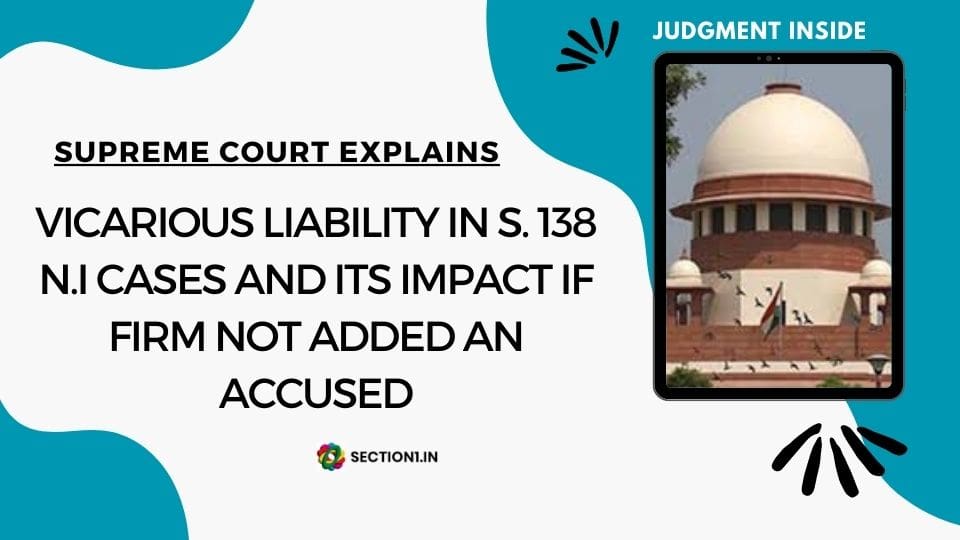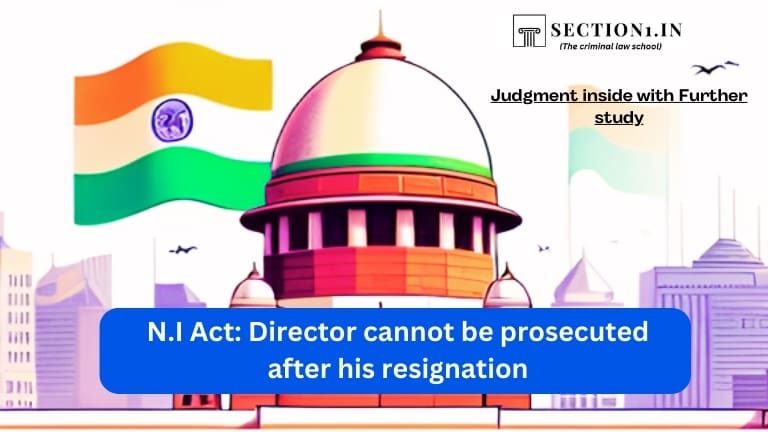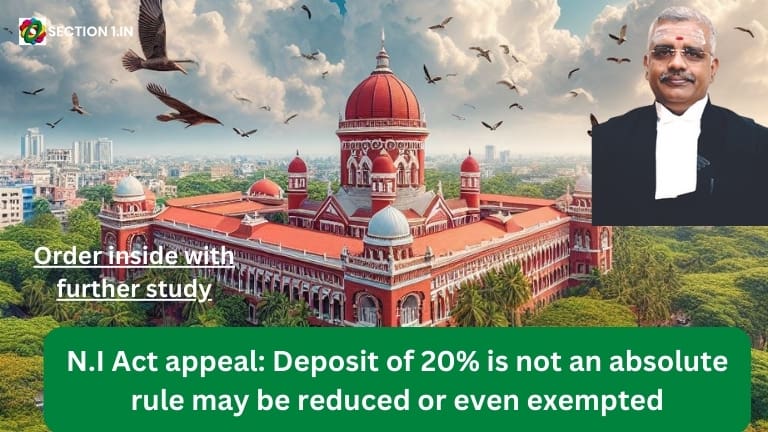Question of law raised
The issues raised in this appeal by the appellant, Dilip Hariramani, challenging his conviction under Section 138 read with Section 141 of the Negotiable Instruments Act, 1881, are covered by the decisions of this Court on the aspects of (i) vicarious criminal liability of a partner; and (ii) whether a partner can be convicted and held to be vicariously liable when the partnership firm is not an accused tried for the primary/substantive offence.
xxx
The word ‘Every person’ in s. 141 N.I Act
- Before we refer to the pertinent legal ratio in the case of Aneeta Hada v. Godfather Travels and Tours Private Ltd [(2012) 5 SCC 661] we would like to refer to an earlier apposite judgment of this Court in State of Karnataka v. Pratap Chand and Others [(1981) 2 SCC 335] in which case prosecution had been initiated under the Drugs and Cosmetics Act, 1940 against a partnership firm and its partners. Reference was made to Section 348 of the Drugs and Cosmetics Act, which is pari materia to Section 141 of the NI Act. Therefore, for the sake of convenience and for deciding the present appeal, we will reproduce Section 141 of the NI Act:
“141. Offences by companies.—(1) If the person committing an offence under Section 138 is a company, every person who, at the time the offence was committed, was in charge of, and was responsible to the company for the conduct of the business of the company, as well as the company, shall be deemed to be guilty of the offence and shall be liable to be proceeded against and punished accordingly:
Provided that nothing contained in this sub-section shall render any person liable to punishment if he proves that the offence was committed without his knowledge, or that he had exercised all due diligence to prevent the commission of such offence.
Provided further that where a person is nominated as a Director of a company by virtue of his holding any office or employment in the Central Government or State Government or a financial corporation owned or controlled by the Central Government or the State Government, as the case may be, he shall not be liable for prosecution under this chapter.
(2) Notwithstanding anything contained in sub-section (1), where any offence under this Act has been committed by a company and it is proved that the offence has been committed with the consent or connivance of, or is attributable to, any neglect on the part of, any director, manager, secretary or other officer of the company, such director, manager, secretary or other officer shall also be deemed to be guilty of that offence and shall be liable to be proceeded against and punished accordingly. Explanation.—For the purposes of this section,—
(a) “company” means any body corporate and includes a firm or other association of individuals; and (b) “director”, in relation to a firm, means a partner in the firm.”
Sub-section (1) to Section 141 of the NI Act states that where a company commits an offence, every person who at the time the offence was committed was in charge of and was responsible to the company for the conduct of the business, as well as the company itself, shall be deemed to be guilty of the offence. The expression ‘every person’ is wide and comprehensive enough to include a director, partner or other officers or persons. At the same time, it follows that a person who does not bear out the requirements of ‘in charge of and responsible to the company for the conduct of its business’ is not vicariously liable under Section 141 of the NI Act. The burden is on the prosecution to show that the person prosecuted was in charge of and responsible to the company for conduct of its business. The proviso, which is in the nature of an exception, states that a person liable under sub section (1) shall not be punished if he proves that the offence was committed without his knowledge or that he had exercised all due diligence to prevent the commission of such offence. The onus to satisfy the requirements and take benefit of the proviso is on the accused. Still, it does not displace or extricate the initial onus and burden on the prosecution to first establish the requirements of sub-section (1) to Section 141 of the NI Act. The proviso gives immunity to a person who is otherwise vicariously liable under sub-section (1) to Section 141 of the NI Act [S.M.S. Pharmaceuticals Ltd. v. Neeta Bhalla and Another, (2005) 8 SCC 89, para 4 and 9].
Onus to prove who is vicariously liable for the company is on the complainant and not on the accused
- Sub-section (2) to Section 141 of the NI Act states that notwithstanding anything contained in sub-section (1), where a company has committed any offence under the Act, and it is proved that such an offence has been committed with the consent or connivance of, or is attributable to any neglect on the part of any director, manager, secretary or other officers of the company, then such director, manager, secretary or other officers of the company shall also be deemed to be guilty of that offence and shall be liable to be proceeded against and punished accordingly. Sub-section (2) to Section 141 of the NI Act does not state that the persons enumerated, which can include an officer of the company, can be prosecuted and punished merely because of their status or position as a director, manager, secretary or any other officer, unless the offence in question was committed with their consent or connivance or is attributable to any neglect on their part. The onus under sub-section (2) to Section 141 of the NI Act is on the prosecution and not on the person being prosecuted.
-
In Pratap Chand (supra), specific reference was made to the Explanation to Section 34 of the Drugs and Cosmetics Act, which states that for Section 34, a ‘company’ means a body corporate and includes a firm or association of individuals, and a ‘director’ in relation to a firm means a partner in the firm. Thereafter, the conviction of the second respondent, one of the partners in the firm therein, was quashed on the ground that he cannot be convicted merely because he has the right to participate in the firm’s business in terms of the partnership deed. Thus, notwithstanding the legal position that a firm is not a juristic person, a partner is not vicariously liable for an offence committed by the firm, unless one of the twin requirements are satisfied and established by the prosecution. ……..
-
We would also refer to the summarisation of law on Section 141 by this Court in National Small Industries Corporation Limited v. Harmeet Singh Paintal and Another [(2010) 3 SCC 330: The case dealt with challenge to a summoning order. Withal, interference by the courts at the stage of summoning order is restricted/limited] to the following effect:
“39. From the above discussion, the following principles emerge:
(i) The primary responsibility is on the complainant to make specific averments as are required under the law in the complaint so as to make the accused vicariously liable. For fastening the criminal liability, there is no presumption that every Director knows about the transaction.
(ii) Section 141 does not make all the Directors liable for the offence. The criminal liability can be fastened only on those who, at the time of the commission of the offence, were in charge of and were responsible for the conduct of the business of the company.
(iii) Vicarious liability can be inferred against a company registered or incorporated under the Companies Act, 1956 only if the requisite statements, which are required to be averred in the complaint/petition, are made so as to make the accused therein vicariously liable for offence committed by the company along with averments in the petition containing that the accused were in charge of and responsible for the business of the company and by virtue of their position they are liable to be proceeded with.
(iv) Vicarious liability on the part of a person must be pleaded and proved and not inferred.xx xx xx
(vii) The person sought to be made liable should be in charge of and responsible for the conduct of the business of the company at the relevant time. This has to be averred as a fact as there is no deemed liability of a Director in such cases.”
The appellant cannot be convicted merely because he was a partner of the firm which had taken the loan or that he stood as a guarantor for such a loan
- In the present case, we have reproduced the contents of the complaint and the deposition of PW-1. It is an admitted case of the respondent Bank that the appellant had not issued any of the three cheques, which had been dishonoured, in his personal capacity or otherwise as a partner. In the absence of any evidence led by the prosecution to show and establish that the appellant was in charge of and responsible for the conduct of the affairs of the firm, an expression interpreted by this Court in Girdhari Lal Gupta v. D.H. Mehta and Another [(1971) 3 SCC 189] to mean ‘a person in overall control of the day-to-day business of the company or the firm’, the conviction of the appellant has to be set aside [State of Karnataka v. Pratap Chand and Others, (1981) 2 SCC 335] The appellant cannot be convicted merely because he was a partner of the firm which had taken the loan or that he stood as a guarantor for such a loan. The Partnership Act, 1932 creates civil liability. Further, the guarantor’s liability under the Indian Contract Act, 1872 is a civil liability. The appellant may have civil liability and may also be liable under the Recovery of Debts Due to Banks and Financial Institutions Act, 1993 and the Securitisation and Reconstruction of Financial Assets and Enforcement of Security Interest Act, 2002. However, vicarious liability in the criminal law in terms of Section 141 of the NI Act cannot be fastened because of the civil liability. Vicarious liability under sub-section (1) to Section 141 of the NI Act can be pinned when the person is in overall control of the day to-day business of the company or firm. Vicarious liability under sub-section (2) to Section 141 of the NI Act can arise because of the director, manager, secretary, or other officer’s personal conduct, functional or transactional role, notwithstanding that the person was not in overall control of the day-to-day business of the company when the offence was committed. Vicarious liability under sub-section (2) is attracted when the offence is committed with the consent, connivance, or is attributable to the neglect on the part of a director, manager, secretary, or other officer of the company.
xxx
- The judgment in Dayle De’souza v. Government of India through Deputy Chief Labour Commissioner (C) and Another [2021 SCC OnLine SC 1012] answered the question of whether a director or a partner can be prosecuted without the company being prosecuted. Reference in this regard was made to the views expressed by this Court in State of Madras v. C.V. Parekh and Another [(1970) 3 SCC 491] on the one hand and the divergent view expressed in Sheoratan Agarwal and Another v. State of Madhya Pradesh15 and Anil Hada v. Indian Acrylic Ltd [(1984) 4 SCC 352]. This controversy was settled by a three Judge Bench of this Court in Aneeta Hada (supra), in which, interpreting and expounding the difference between the primary/substantial liability and vicarious liability under Section 141 of the NI Act.
-
The provisions of Section 141 impose vicarious liability by deeming fiction which presupposes and requires the commission of the offence by the company or firm. Therefore, unless the company or firm has committed the offence as a principal accused, the persons mentioned in sub-section (1) or (2) would not be liable and convicted as vicariously liable. Section 141 of the NI Act extends vicarious criminal liability to officers associated with the company or firm when one of the twin requirements of Section 141 has been satisfied, which person(s) then, by deeming fiction, is made vicariously liable and punished. However, such vicarious liability arises only when the company or firm commits the offence as the primary offender. This view has been subsequently followed in Sharad Kumar Sanghi v. Sangita Rane [(2015) 12 SCC 781] Himanshu v. B. Shivamurthy and Another [(2019) 3 SCC 797] and Hindustan Unilever Limited v. State of Madhya Pradesh [(2020) 10 SCC 751]. The exception carved out in Aneeta Hada (supra) which applies when there is a legal bar for prosecuting a company or a firm, is not felicitous for the present case. No such plea or assertion is made by the respondent.
Party
DILIP HARIRAMANI vs. BANK OF BARODA – Criminal Appeal @ SLP (Crl.) No. 641 of 2021 – MAY 09, 2022
https://main.sci.gov.in/supremecourt/2021/942/942_2021_16_1501_35660_Judgement_09-May-2022.pdf






